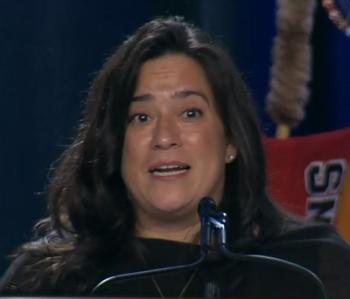Image Caption
By Shari Narine
Windspeaker Contributor
OTTAWA
On the strength of a private member’s bill, the federal government is making a major move forward in fulfilling an election promise to implement all 94 Calls to Action put forward by the Truth and Reconciliation Commission, including the direction that all levels of government fully adopt and implement the United Nations Declaration on the Rights of Indigenous Peoples (UNDRIP).
Tuesday afternoon, Dec. 5, NDP MP Romeo Saganash’s Bill C-262, an act to ensure Canada's laws are in harmony with the United Nations Declaration, was introduced for second reading in the House of Commons.
Justice Minister Jody Wilson-Raybould had that morning delivered a speech to the Assembly of First Nations Special Assembly in Ottawa. She told the chiefs “This step alone will not accomplish full implementation of the United Nations Declaration. A comprehensive approach, one that our government is committed to, will require other appropriate measures, including legislative measures, through the development of a recognition of rights framework.”
But in July 2016, Wilson-Raybould addressed the AFN telling chiefs and delegates that Saganash’s private member’s bill to adopt the declaration as Canadian law was “unworkable and, respectfully, a political distraction to undertaking the hard work required to actually implement it back home in communities.”
It’s a stand that Conservative MP Cathy McLeod called the Liberals on during discussion of the bill.
“The Justice minister … has access to all sorts of comprehensive briefings and advice. The minister would not have made that comment lightly, so I think it’s critical for her to explain why she made that comment at the time and how she now reconciles with her recent commitment to support the bill,” said McLeod.
McLeod also noted that the Liberals had said that any changes to the Indian Act or the Labour Code could only be introduced as government legislation so as to provide an opportunity for “comprehensive reflection and not just a couple of hours of debate.” Private member's bills are limited to two hours of debate.
Wilson-Raybould was not in the House.
Saganash said McLeod’s concerns, and the questions raised by other opposition members and government members would be addressed if the bill received second reading, which would then send it to the Standing Committee of Indigenous and Northern Affairs for debate.
"One of the things we can do is send this bill to committee so we can study it further with experts ...so that we can answer some of the concerns the member has in regard to the UN Decaration and the fundamental rights of Indigenous peoples,” said Saganash.
MP Yvonne Jones, parliamentary secretary for Crown-Indigenous Relations and Northern Affairs, said Bill C-262 is only one part of the process the Liberal government is engaging in to establish a renewed nation-to-nation relationship with Indigenous peoples.
“In the context that we are here today to discuss Bill C-262, this bill proposes the process of dialogue and the development of an action plan that’s aimed at ensuring consistency between federal law and the Declaration. Such an approach is consistent with other ongoing processes (of the government),” said Jones.
She listed actions the Liberals had already taken, such as establishing a working group of ministers to review laws, policies and operational practices; permanent bilateral mechanisms created with national Indigenous organizations; and the establishment of 50 Indigenous rights and self-determination discussion tables across the country.
“We are pleased to support Bill C-262 while remaining committed to further action in partnership with Indigenous people,” said Jones.
Saganesh thanked the ministers of Justice and Indigenous Affairs Carolyn Bennett for “finally accepting that this should be a framework for reconciliation in this country.”
Saganesh was intricately involved for over two decades in drafting UNDRIP, which was unanimously adopted by the United Nation’s General Assembly in 2007.
The UN Declaration recognizes the rights of Indigenous people to be free from racial discrimination; to have the right to self-determination and autonomy; the right to financial compensation for confiscated lands; right to their language and culture; and it requires the government obtain free and informed consent prior to approving projects on Indigenous land.
Bill C-262, which was debated for an hour yesterday, will be up for debate for a second hour in February. The House of Commons will vote on second reading in March.

